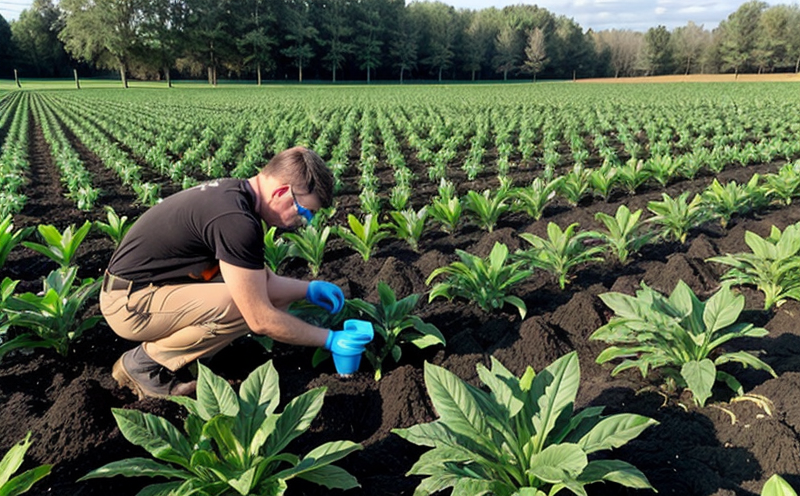Organic Carbon Content Testing in Fertilizers
The testing of organic carbon content in fertilizers is an essential process that ensures the quality and safety of agricultural inputs. Organic carbon, a component of organic matter present in soil amendments, plays a crucial role in enhancing soil structure, improving water retention, and supporting beneficial microorganisms. In this section, we will delve into the detailed procedures involved in testing organic carbon content using advanced analytical techniques.
The process begins with selecting an appropriate sample from the batch of fertilizers to be tested. The specimen preparation involves drying the sample under controlled conditions at a specific temperature (typically 105°C) until it reaches constant weight, which ensures that any moisture content is removed. After drying, the sample may undergo further processing such as grinding or sieving to achieve an even particle size.
Once prepared, the sample is subjected to combustion analysis in a high-temperature furnace where organic carbon is oxidized into CO2. The resulting gas stream passes through a series of detectors that measure the amount of CO2 produced. This value directly corresponds to the organic carbon content within the fertilizer sample. The accuracy and precision of this method are enhanced by adhering strictly to international standards such as ISO 15974.
It is important to note that accurate measurement requires careful calibration of equipment, regular maintenance, and adherence to strict operating procedures. Additionally, quality assurance measures ensure consistency across different batches and laboratories involved in the testing process.
- Calibration using certified reference materials
- Daily checks on furnace temperature stability
- Regularly scheduled instrument recalibrations
The results from these tests provide valuable insights into the organic carbon content of fertilizers, which helps in optimizing their use for sustainable agricultural practices. Understanding this parameter aids farmers and agronomists in making informed decisions about nutrient management strategies aimed at enhancing crop yields without compromising environmental sustainability.
Moreover, knowing the exact amount of organic carbon present allows for better integration of these products into broader soil health improvement plans. This information also supports compliance with regulatory requirements set by various national and international bodies concerning agricultural inputs.
Why It Matters
Testing the organic carbon content in fertilizers is not just about ensuring product quality; it has far-reaching implications for both environmental protection and agricultural productivity. By accurately determining this value, stakeholders can ensure that they are utilizing resources efficiently while minimizing adverse effects on ecosystems.
Agricultural runoff containing excess nutrients from improperly managed fertilizers can lead to water pollution and eutrophication in nearby bodies of water. On the other hand, when organic carbon levels are optimized through testing, farmers can reduce their environmental footprint by applying precisely what is needed for optimal plant growth without causing harm elsewhere.
Furthermore, understanding the organic carbon content enables more effective integration into soil amendment programs designed to increase biodiversity and resilience against climate change impacts like droughts or floods. It supports efforts towards creating healthier soils capable of sequestering additional amounts of atmospheric CO2 through increased microbial activity and improved plant root development.
Eurolab Advantages
At Eurolab, we pride ourselves on providing top-notch services tailored specifically to meet the needs of our clients in agriculture & forestry sectors. Our team comprises highly skilled professionals equipped with state-of-the-art facilities dedicated solely to executing these types of analyses accurately and reliably.
We employ advanced analytical techniques that ensure consistent results regardless of variations between batches or over time. Our commitment to excellence is reflected not only in the quality of our work but also through continuous training for our staff members and investment in cutting-edge technology.
Our clients benefit from our expertise in interpreting data correctly, offering actionable recommendations based on findings derived from thorough testing processes. Whether you need assistance with regulatory compliance or simply wish to improve your current practices, Eurolab stands ready to support you every step of the way.
Environmental and Sustainability Contributions
The accurate measurement of organic carbon in fertilizers contributes significantly towards achieving sustainable agricultural practices. Here are some ways this testing supports sustainability goals:
- Prevents excess nutrient runoff into water bodies, reducing pollution risks.
- Supports healthier soil ecosystems leading to better crop yields.
- Facilitates the creation of more resilient soils capable of adapting to changing climatic conditions.
- Promotes efficient resource utilization which aligns with global sustainability initiatives aimed at minimizing agricultural impacts on natural resources.
Through precise control over organic carbon content, we contribute towards creating a more sustainable future for agriculture and forestry industries worldwide.





